After the wall fell
The families still waiting for 'justice'

Lassana

Like many nine-year-old boys Lassana loved football. In the streets and parks near his home outside Barcelona he would spend hours kicking a ball around with his friends.
But unlike the thousands of other boys hoping to become stars, Lassana’s natural talent had been noticed.
An FC Barcelona scout had spotted him and wanted to sign him for the club’s famous youth academy, where stars such as Lionel Messi had cut their teeth.
But Lassana’s father, Ousmane, was not there to celebrate with him. He had moved to Birmingham, England, months before in search of work.
Despite living thousands of miles away, Ousmane still arranged lifts to training and games for Lassana or his older brother Mohammadu, who played for a different team. Before every match he would also call them and wish them luck.
But one night, the phone call never came.

Lassana joined FC Barcelona's famous La Masia youth academy
Lassana joined FC Barcelona's famous La Masia youth academy
It was 7 July 2016. Lassana and Mohammadu were settling down in front of the TV to watch France play Germany in Euro 2016.
Mohammadu was due to play in a tournament the next day. WhatsApp showed their father had been online that morning. The boys watched the game, waiting for their father to call.
Their mother, Aminata, tried not to worry. Ousmane had phoned his family every day since moving to the UK. She busied herself with the household chores and comforted her three-year-old daughter Fanta who, unusually, would not stop crying.
The boys continued to wait. As the match neared its end, they were interrupted by a knock at the door. It was their great-uncle, Keemo.
Keemo told Aminata he had found out about an accident at Ousmane’s workplace, a recycling centre in Birmingham where he sorted scrap metal.
He told her no-one had heard from him since. Aminata knew straight away what this meant.
“As soon as he came, I just knew something was not right,” she says.
“I said 'This is the man I married. I can tell you he has never gone a whole day without calling us. So I can confirm it for you.'”
Ousmane, her husband, was dead.


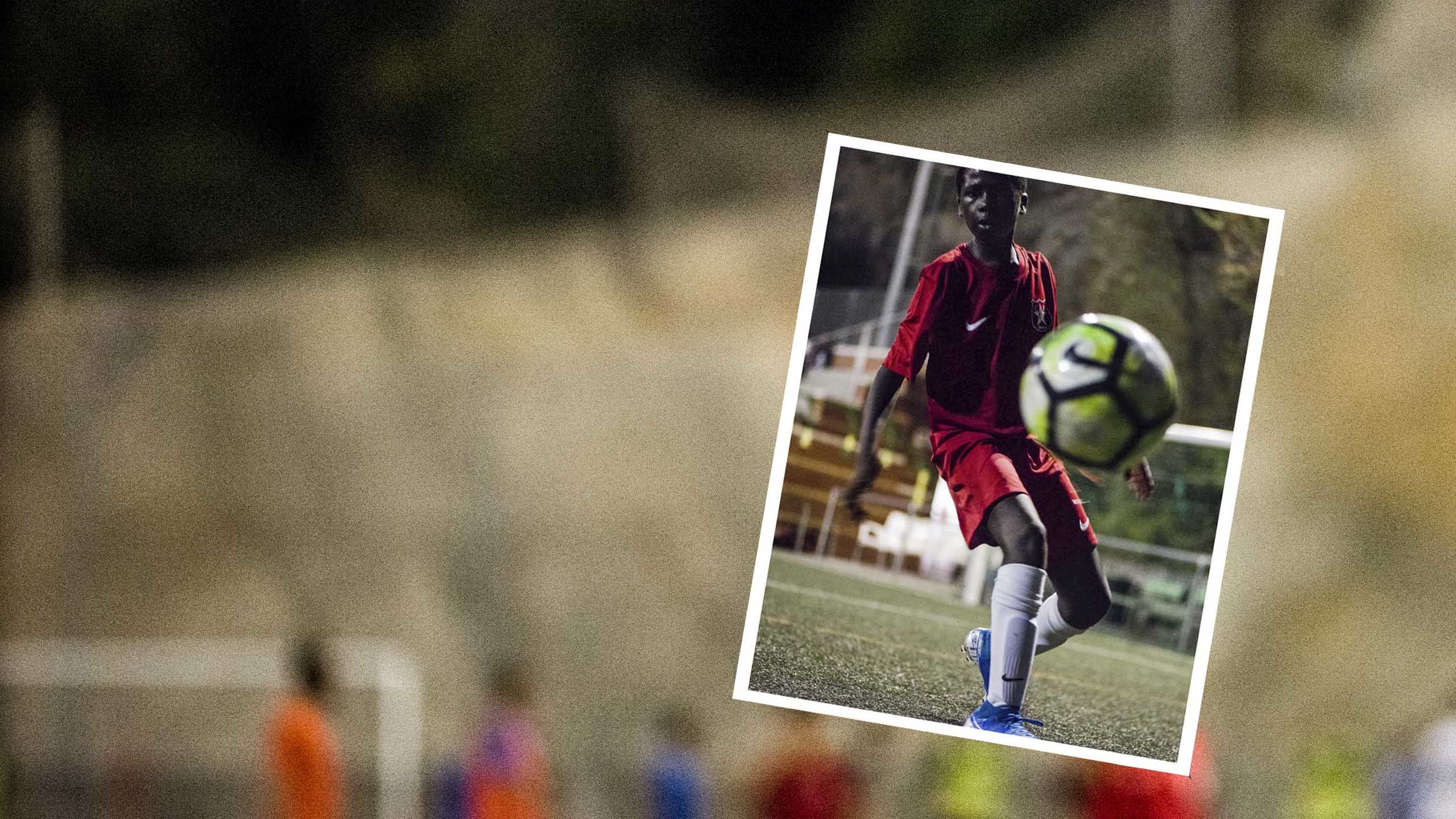
Like many nine-year-old boys Lassana loved football. In the streets and parks near his home outside Barcelona he would spend hours kicking a ball around with his friends.
But unlike the thousands of other boys hoping to become stars, Lassana’s natural talent had been noticed.
An FC Barcelona scout had spotted him and wanted to sign him for the club’s famous youth academy, where stars such as Lionel Messi had cut their teeth.
But Lassana’s father, Ousmane, was not there to celebrate with him. He had moved to Birmingham, England, months before in search of work.
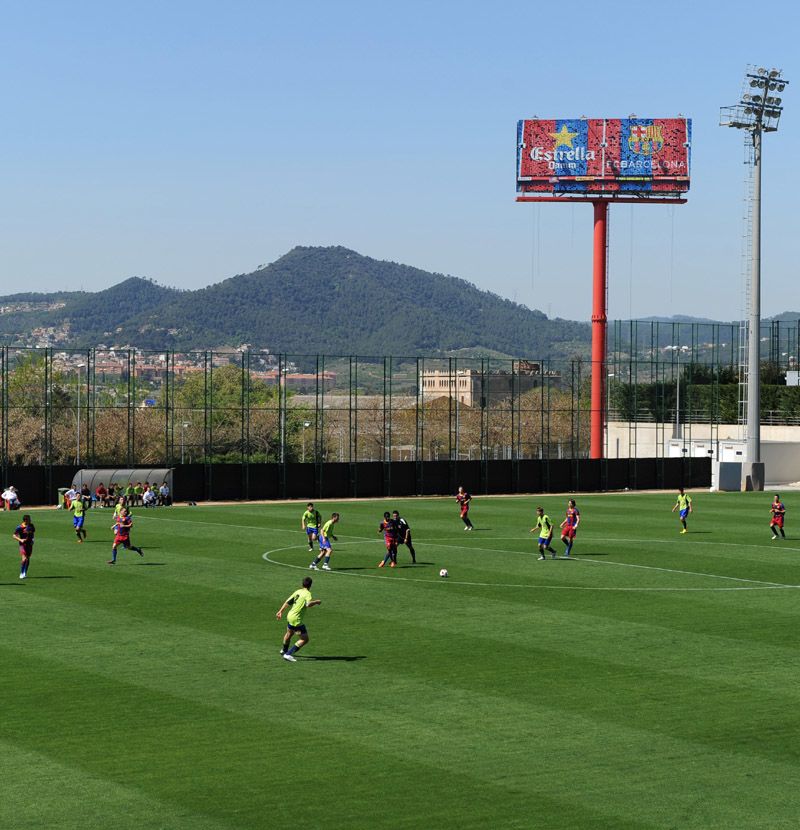
Lassana joined FC Barcelona's famous La Masia youth academy
Lassana joined FC Barcelona's famous La Masia youth academy
Despite living thousands of miles away, Ousmane still arranged lifts to training and games for Lassana or his older brother Mohammadu, who played for a different team. Before every match he would also call them and wish them luck.
But one night, the phone call never came.
It was 7 July 2016. Lassana and Mohammadu were settling down in front of the TV to watch France play Germany in Euro 2016.
Mohammadu was due to play in a tournament the next day. WhatsApp showed their father had been online that morning. The boys watched the game, waiting for their father to call.
Their mother, Aminata, tried not to worry. Ousmane had phoned his family every day since moving to the UK. She busied herself with the household chores and comforted her three-year-old daughter Fanta who, unusually, would not stop crying.
The boys continued to wait. As the match neared its end, they were interrupted by a knock at the door. It was their great-uncle, Keemo.


Keemo told Aminata he had found out about an accident at Ousmane’s workplace, a recycling centre in Birmingham where he sorted scrap metal.
He told her no-one had heard from him since. Aminata knew straight away what this meant.
“As soon as he came, I just knew something was not right,” she says.
“I said 'This is the man I married. I can tell you he has never gone a whole day without calling us. So I can confirm it for you.'”
Ousmane, her husband, was dead.

One week later, Lassana signed for FC Barcelona’s youth academy. The next day he and his mother and siblings boarded a flight to the UK.
Before he died, Ousmane had saved enough money for his family to visit him in Birmingham. It was intended in part as a celebration of Lassana’s success.
Instead they were flying out to retrieve his body.
At the airport, the family were met by police. Aminata found herself completely disorientated and rooted to the spot.
“I found it so difficult, I couldn’t move forward,” she says. “The police had to actually move me and take me into the room. It felt like someone was holding my legs.”
In a side room, Ousmane's brother, who lived in the UK, translated into their native language, Mandinka, as the police explained what had happened.
They said Ousmane had been working at a metal recycling centre when a concrete wall toppled over and crushed him and four other men.
The police offered to let Aminata see her husband’s body for the last time but, crying, she refused.
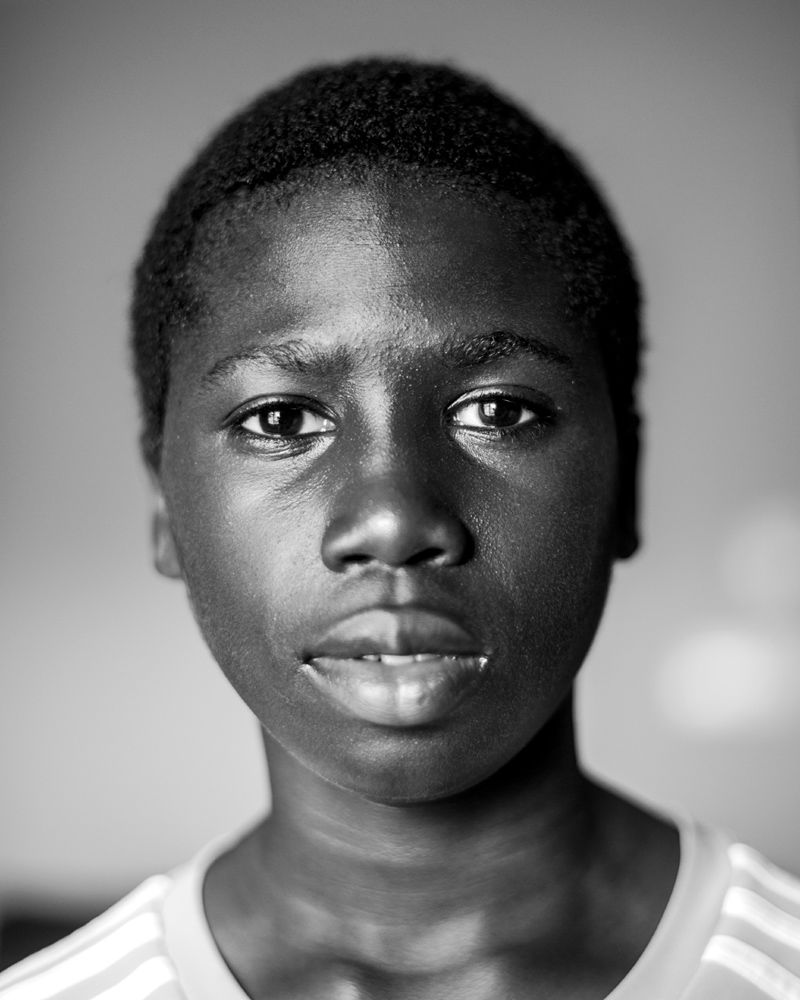

One week later, Lassana signed for FC Barcelona’s youth academy. The next day he and his mother and siblings boarded a flight to the UK.
Before he died, Ousmane had saved enough money for his family to visit him in Birmingham. It was intended in part as a celebration of Lassana’s success.
Instead they were flying out to retrieve his body.

At the airport, the family were met by police. Aminata found herself completely disorientated and rooted to the spot.
“I found it so difficult, I couldn’t move forward,” she says. “The police had to actually move me and take me into the room. It felt like someone was holding my legs.”
In a side room, Ousmane's brother, who lived in the UK, translated into their native language, Mandinka, as the police explained what had happened.
They said Ousmane had been working at a metal recycling centre when a concrete wall toppled over and crushed him and four other men.
The police offered to let Aminata see her husband’s body for the last time but, crying, she refused.

“My father was very, very happy when I was picked by Barcelona,” says Lassana, who is now aged 13.
“I was so happy. If he was alive now, not only would he be encouraging me, he would be saying try harder because it’s so competitive to be a footballer.”
Lassana scores an impressive solo goal for FC Barcelona's youth team
But life for Lassana and his family has been a struggle since. Three years after his father's death they have still not received compensation.
The family of five share a small apartment in the town of Parets del Valles, surviving on monthly benefits of about 1,000 euros (£880).
There is no money for trips out and other treats for the children. Instead Aminata takes them to the park to play. On birthdays, she prepares a meal and bakes a cake but presents are another luxury the family cannot afford.

“Apart from the emotional day-to-day struggle, it’s paying for books and school trips for the four children,” she says.
“When did I last buy myself something? I have no consideration for that. I have bought myself nothing since Ousmane passed away. I can’t think of that.
“It’s all for the children and just surviving.”


Ousmane had left Senegal in search of work in the late 1990s. Like many west Africans, he settled in Spain, where he lived legally and worked as a security guard.
But the Spanish economy was hit by the global economic crisis of 2008. Ousmane first found his hours reduced, then eventually lost his job. He struggled to find new work and moved to the UK in March 2016, leaving his family behind.
Just four months later he was dead.

Even when he had been alive, Aminata struggled to make ends meet. Ousmane had not just been supporting his wife and children but relatives back in Senegal too.
Each month he would send between 150 and 200 euros to his widowed mother and six brothers and sisters. He was also expected to send occasional money to Aminata’s father as a sign of "respect".
The men who died alongside Ousmane were from The Gambia - Senegal's smaller neighbour.
Each was sending money back to family in Africa, despite only earning the UK minimum wage of just over £7 an hour. Their relatives depended on this money for survival in one of the world's poorest regions.
The men's deaths left these families impoverished.

Three-and-a-half years later, the men's families still have questions about how and why they died.
An inquest jury found their deaths were accidental but Shredmet, the firm that ran the recycling centre, had failed to notice the wall's dangerous state. The inquest concluded this “caused or contributed” to the men’s deaths.
A criminal investigation by the UK’s Health and Safety Executive (HSE) has still not concluded.
The families say they have not been contacted by Shredmet since just after the wall collapsed.
It has left them feeling bitter and ignored.
“In my opinion it's very clear they [Shredmet] don't value human life,” says Aminata.
“I came to England [to identify the body] and spent that time there and I never once saw the owners or heard from them. They don't seem to care about people.”
This summer Lassana was dealt another blow - he was let go by FC Barcelona’s youth team.
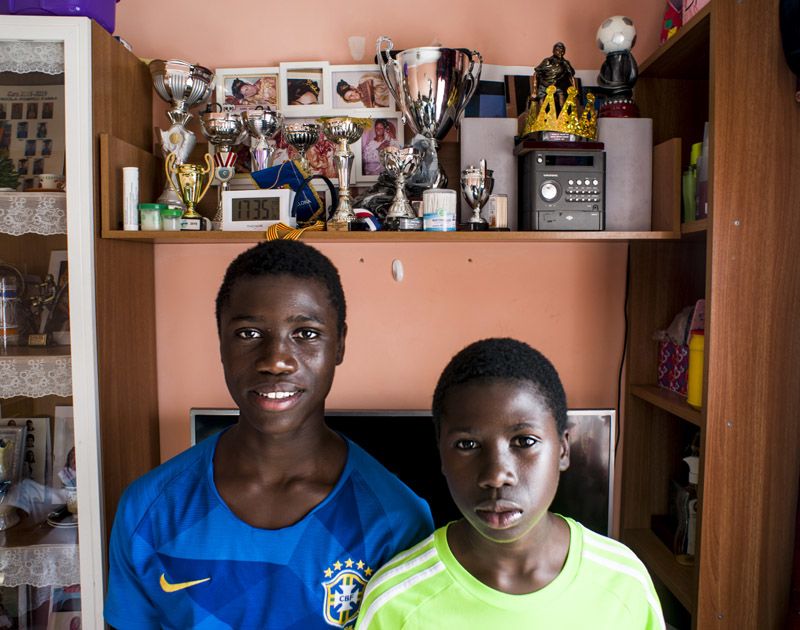
He is not too disappointed. He says he has been told if he works hard he can force his way back in. He is still determined to make it as a footballer, for his father’s memory.
“It makes me work harder and if I do really well, I’ll dedicate it to him, to show what I can do from my hard work,” he says.
But he has other matters on his mind. He wants to know why his father died at work.
“The company needs to recognise the wrong it’s done,” he says. “It’s not just about money. We need to have justice.”
Dado

Whenever her phone rang, Dado hoped it was her husband. She would answer it and the peace of her rural surroundings in the east of The Gambia would be shattered, replaced by the sound of lorries and machinery.
Then she would hear Saibo’s voice say “hello”.
They spoke several times each day, despite having lived thousands of miles apart for much of their long marriage.

Wearing a headset under his hard hat, Saibo would talk to Dado and his children for hours. They discussed their family, their friends, and their plans for the future.
Although their marriage had been arranged, it had been a love match too.
As young newlyweds they would hold hands in public, defying the disapproval of their conservative neighbours. The Gambia’s Islamic culture permitted men up to four wives, but Saibo opted for just one - Dado.
“He would buy me little things, hug and hold me,” she says. “Whatever he could do for me, he would - and me for him.”
But poverty in The Gambia meant Saibo was always going to leave in search of work.
The country is among Africa’s poorest. Situated on either bank of the Gambia River, Western tourists are drawn to its beautiful beaches and year-round sunshine.
Most Gambians support themselves through tourism or subsistence farming. But more than a fifth of the country’s GDP consists of money sent back by Gambians working abroad, according to a 2017 report by the International Fund for Agricultural Development.
These migrants typically do the kind of physically tough, unpleasant and poorly paid jobs many Europeans do not want.
It was the prospect of such work that persuaded Saibo to move from Spain to the UK in 2014.
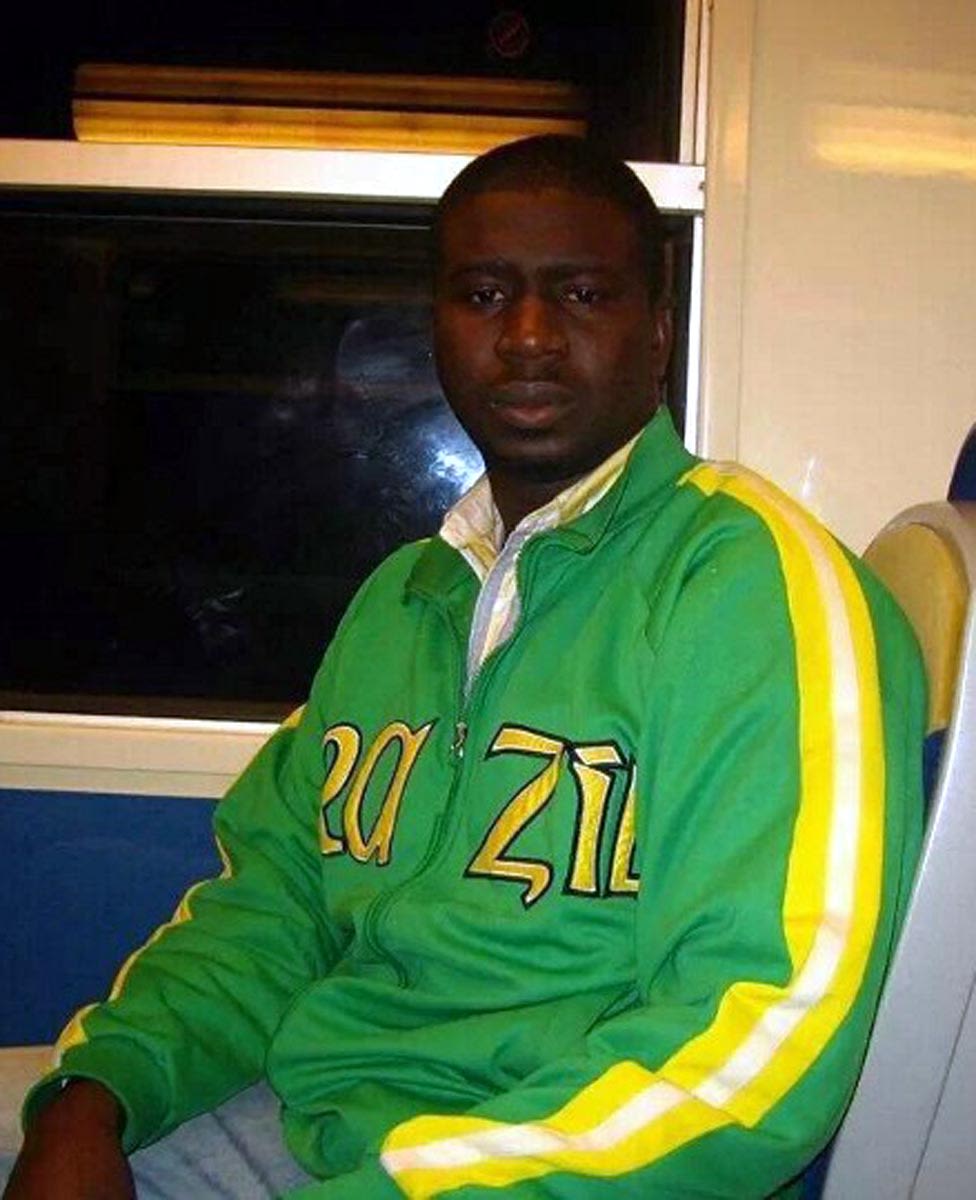
After many years living apart, Saibo was tantalisingly close to being reunited with his family in Europe.
In Spain, where he had lived for 10 years, he had been unable to afford the visas. Before that he had mined diamonds in Sierra Leone, but the civil war there meant it was too dangerous for his family.
Now, in the UK, he was earning more money. He submitted his family's immigration application to the Home Office and paid for expensive DNA checks to confirm he was the father of his four children.
While he waited to hear news he carried on picking through the metal at the recycling centre.
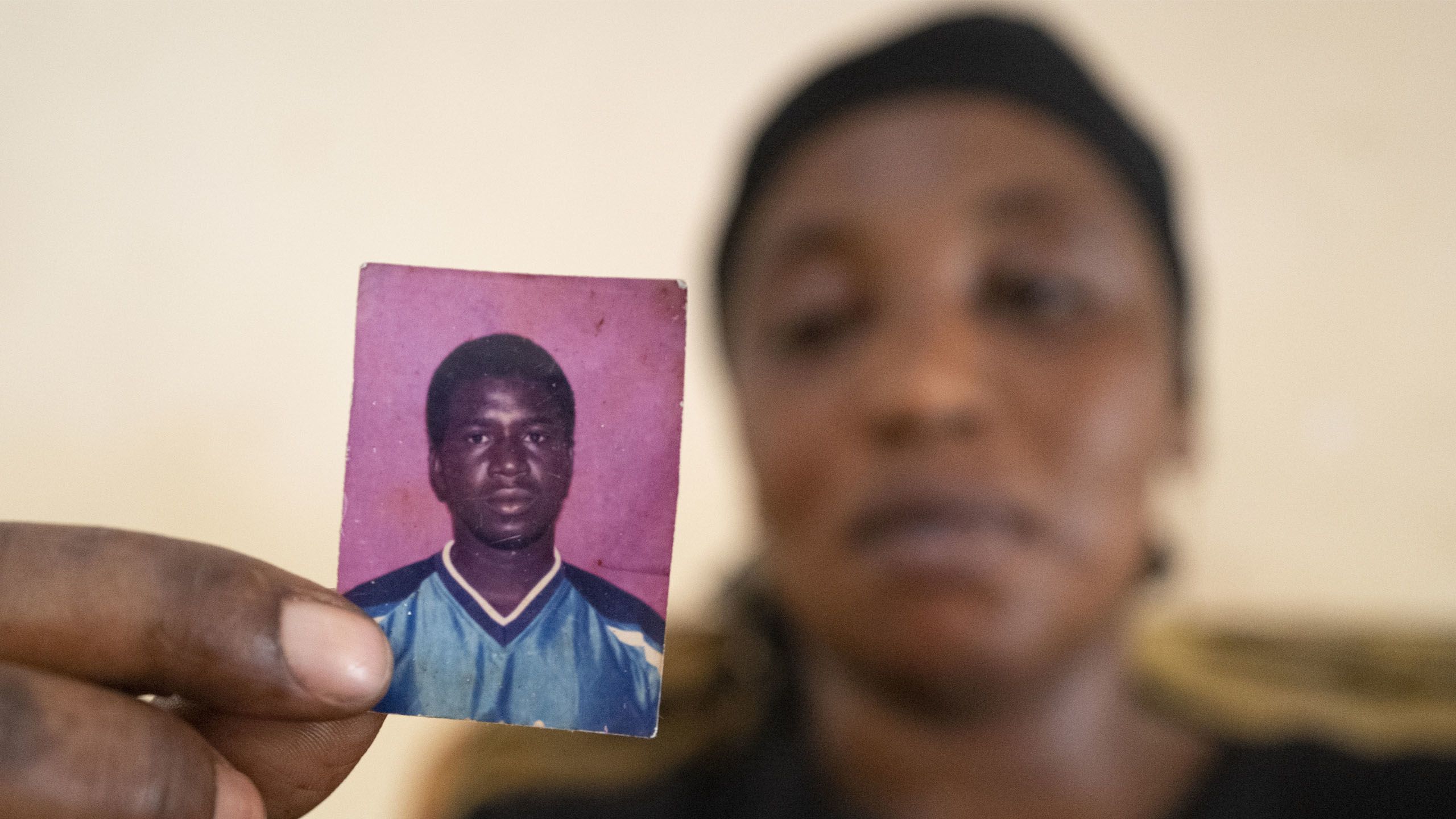
Saibo had called Dado as normal before he started work on 7 July 2016. He told her he was busier than usual because many workers were still celebrating Eid and had not come in.
“It was early-morning prayers when we spoke and he said 'God willing, my family will be here soon,’” Dado says.
He told her he would call later during his break. But that call never came.
Saibo’s job was hard, dirty and noisy. Lorries would come and go all day, depositing large piles of waste material at the site in Nechells, near Birmingham city centre.
The men would spend the day sorting through this pile and separating out the metal. At the end of each shift, they would go home caked in dirt.
Poorly paid, their employment was also precarious - their jobs were in the “gig economy” and they did not know from one day to the next whether they would have work. It was also - unbeknown to them - incredibly dangerous.
The men would stand next to a conveyor belt housed in a large steel-framed shed with the top of the belt jutting through the roof.

The men were clearing metal from the right-hand side bay when the wall fell
The men were clearing metal from the right-hand side bay when the wall fell
If the belt stopped working, as it would from time to time, the men would be told to sweep out bays storing piles of metal.
Bordering one of these bays was a towering wall consisting of concrete blocks. There was no mortar joining the blocks - they were designed to interlock - and the wall had no foundations. But the design was safe and legal if appropriately used.
This wall, however, had been loaded on one side with 263 tonnes of metal briquettes. As the men cleared out the bay on the other side of the wall, the concrete blocks collapsed without warning.
The men below stood no chance. After the wreckage was cleared, their broken bodies could only be identified by their fingerprints.
Saibo had called Dado as normal before he started work on 7 July 2016. He told her he was busier than usual because many workers were still celebrating Eid and had not come in.
“It was early-morning prayers when we spoke and he said 'God willing, my family will be here soon,’” Dado says.
He told her he would call later during his break. But that call never came.
Saibo’s job was hard, dirty and noisy. Lorries would come and go all day, depositing large piles of waste material at the site in Nechells, near Birmingham city centre.
The men would spend the day sorting through this pile and separating out the metal. At the end of each shift, they would go home caked in dirt.
Poorly paid, their employment was also precarious - their jobs were in the “gig economy” and they did not know from one day to the next whether they would have work. It was also - unbeknown to them - incredibly dangerous.
The men would stand next to a conveyor belt housed in a large steel-framed shed with the top of the belt jutting through the roof.
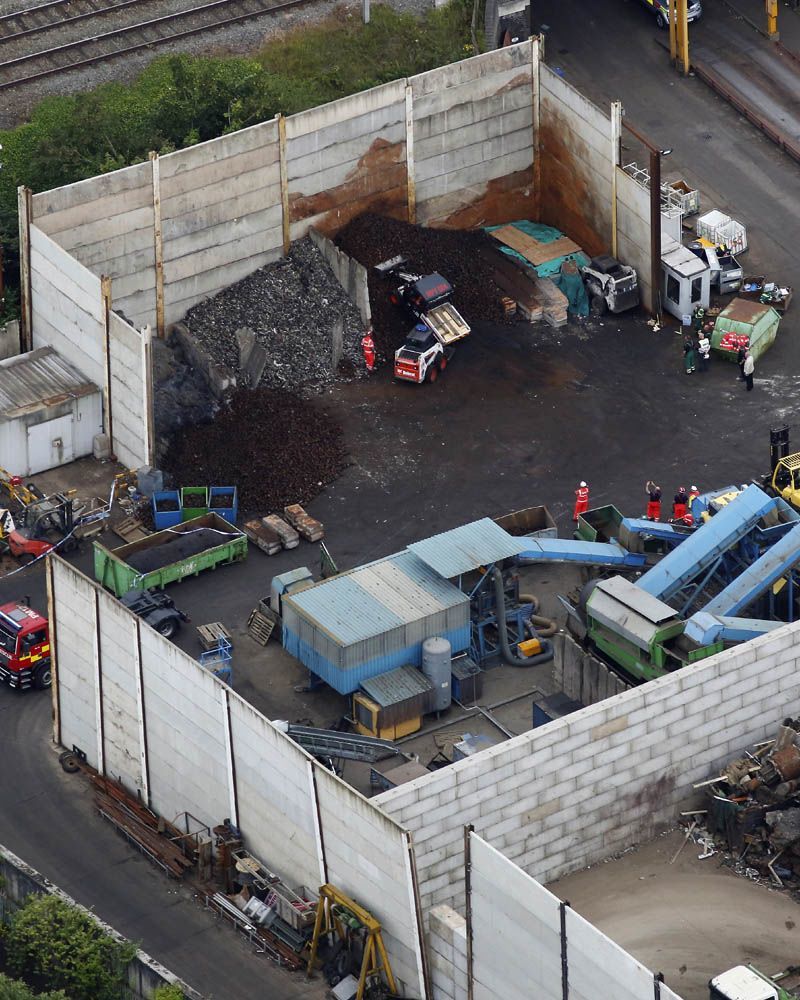
The men were clearing metal from the right-hand side bay when the wall fell
The men were clearing metal from the right-hand side bay when the wall fell
If the belt stopped working, as it would from time to time, the men would be told to sweep out bays storing piles of metal.
Bordering one of these bays was a towering wall consisting of concrete blocks. There was no mortar joining the blocks - they were designed to interlock - and the wall had no foundations. But the design was safe and legal if appropriately used.
This wall, however, had been loaded on one side with 263 tonnes of metal briquettes. As the men cleared out the bay on the other side of the wall, the concrete blocks collapsed without warning.
The men below stood no chance. After the wreckage was cleared, their broken bodies could only be identified by their fingerprints.

Dado had been pregnant with twins the last time she saw her husband. Now those girls are six years old.
She has decided not to tell them about their father’s death yet. She tells them Saibo is still working abroad. The rest of the family go along with the fiction.
Home is her uncle’s cramped compound in Serrekunda, a bustling town close to the Gambian capital, Banjul. Dado and her children share the home with her sister, brothers and mother.

After Saibo’s death she moved out of his family compound in the village of Garowol, where she had lived since they married in 2000.
Saibo’s wages had indirectly supported about 50 people, including Dado and her children, but the loss of his income made it difficult for them to support her. No-one asked her to move out, but custom dictated she should.
She is now desperately short of money.
“Having no husband and four kids is hard,” she says. “I am obviously really struggling.
“I have tried every avenue to get work - cooking, cleaning - but struggled and not found anything. Friends help out when they can. I don’t know what the future holds.
“If I got some money then it would be so my children would have a better life and can achieve an education - that’s the only way it can happen.
“I would not buy luxury things, I would save it for the children and a better life and their future. I have no idea what [compensation] we would get, if anything.”

Half a world away it has been difficult for her to find out more about what happened to her husband.
The inquest into the men's deaths was in November 2018 - more than two years after the wall collapsed. Dado tried to attend but the UK did not grant her a visa in time. She arrived three days after the hearing concluded.
She consoles herself remembering happier times, when Saibo would come to visit her in The Gambia from Spain.

“He’d tell me about Europe and how different it was to Africa and how he lived. I think then that we were getting close to our dream [of living together in Europe].
“But I had to accept that in either three, four or five months he was going again. As a woman from The Gambia you expect this to happen, to be apart.”
After years of dreaming, the family had been finally on the verge of reuniting. Then the accident happened.
“My world changed that day,” says Dado. “We didn’t have long enough together as a couple. Clearly, this has destroyed our life. I don't know what to think about the future.
“In our culture, the worst thing that can happen to you is for your husband to die.”
Dado had been pregnant with twins the last time she saw her husband. Now those girls are six years old.
She has decided not to tell them about their father’s death yet. She tells them Saibo is still working abroad. The rest of the family go along with the fiction.
Home is her uncle’s cramped compound in Serrekunda, a bustling town close to the Gambian capital, Banjul. Dado and her children share the home with her sister, brothers and mother.
After Saibo’s death she moved out of his family compound in the village of Garowol, where she had lived since they married in 2000.
Saibo’s wages had indirectly supported about 50 people, including Dado and her children, but the loss of his income made it difficult for them to support her. No-one asked her to move out, but custom dictated she should.
She is now desperately short of money.

“Having no husband and four kids is hard,” she says. “I am obviously really struggling.
“I have tried every avenue to get work - cooking, cleaning - but struggled and not found anything. Friends help out when they can. I don’t know what the future holds.
“If I got some money then it would be so my children would have a better life and can achieve an education - that’s the only way it can happen.
“I would not buy luxury things, I would save it for the children and a better life and their future. I have no idea what [compensation] we would get, if anything.”

Half a world away it has been difficult for her to find out more details of what happened to her husband.
The inquest into the men's deaths was in November 2018 - more than two years after the wall collapsed. Dado tried to attend but the UK did not grant her a visa in time. She arrived three days after the hearing concluded.
She consoles herself remembering happier times, when Saibo would come to visit her in The Gambia from Spain.

“He’d tell me about Europe and how different it was to Africa and how he lived. I think then that we were getting close to our dream [of living together in Europe].
“But I had to accept that in either three, four or five months he was going again. As a woman from The Gambia you expect this to happen, to be apart.”
After years of dreaming, the family had been finally on the verge of reuniting. Then the accident happened.
“My world changed that day,” says Dado. “We didn’t have long enough together as a couple. Clearly, this has destroyed our life. I don't know what to think about the future.
“In our culture, the worst thing that can happen to you is for your husband to die.”
Hatoumata

Hatoumata’s house in Winson Green, Birmingham, is cold and damp. Outside, a cupboard has been left by someone to rot.
Litter is scattered around the street. Almost every room of her home has black mould on the walls.
She worries about the cough her four-year-old daughter Fatou has developed. The cough is so pronounced, concerned staff at her nursery have also tried to contact the landlord about the damp.

Unaware, little Fatou chirps and giggles as she plays around the house, her boundless energy keeping her mother busy.
Hatoumata tries to make her money last but it is hard. There is nothing spare after each cycle of benefits. She has no family living nearby and very few friends. She is lonely and depressed.
It has been like this since her husband died.

Like most Gambian women, Hatoumata had always been dependent on men.
She was 10 years old when her family arranged her marriage to 37-year-old Mohammadou. She was his second wife but the age gap was not unusual - their marriage would not be consummated until she was an adult.
Mohammadou was already working in Spain and flew back there almost immediately after the wedding. Meanwhile, Hatoumata went to live with Mohammadou’s family in their compound.
She would see her husband infrequently over the next 12 years. Then, when she was 22, he asked her to live with him in Birmingham, where he had moved in search of work. She was soon mother to a baby girl.

“I was very lonely at first because I was missing my family and I was here alone as Mohammadou was out working all day,” she says.
“Over time, I began to settle. We planned to stay in Birmingham and this would be our life and to have more children. But then it changed.”
The night before the accident they had celebrated Eid at their local mosque. Although Ramadan had ended, Mohammadou had chosen to fast for six more days. So Hatoumata rose before dawn to heat through his breakfast.
After he left for work, she went back to bed with Fatou. They were asleep when she heard banging at the door. She opened it and was confronted by the sight of two police officers.
“They were standing outside and I asked ‘How can I help you?’, but I didn’t understand the language,” she says.
“Because of that, I said ‘Hold on, I will call my husband and he can talk to you’. So I called him and it was ringing and ringing and he wasn't picking it up.”
As she waited for a friend to come over to translate, other Gambian men - friends of her husband - turned up at her house. Some asked if she had been in touch with Mohammadou. None mentioned to her what had happened.
Eventually, her friend arrived and she learned, from the police, that her husband had died.
“I could not believe it,” Hatoumata says. “I knew he worked with metals but I never thought it was a dangerous job.”
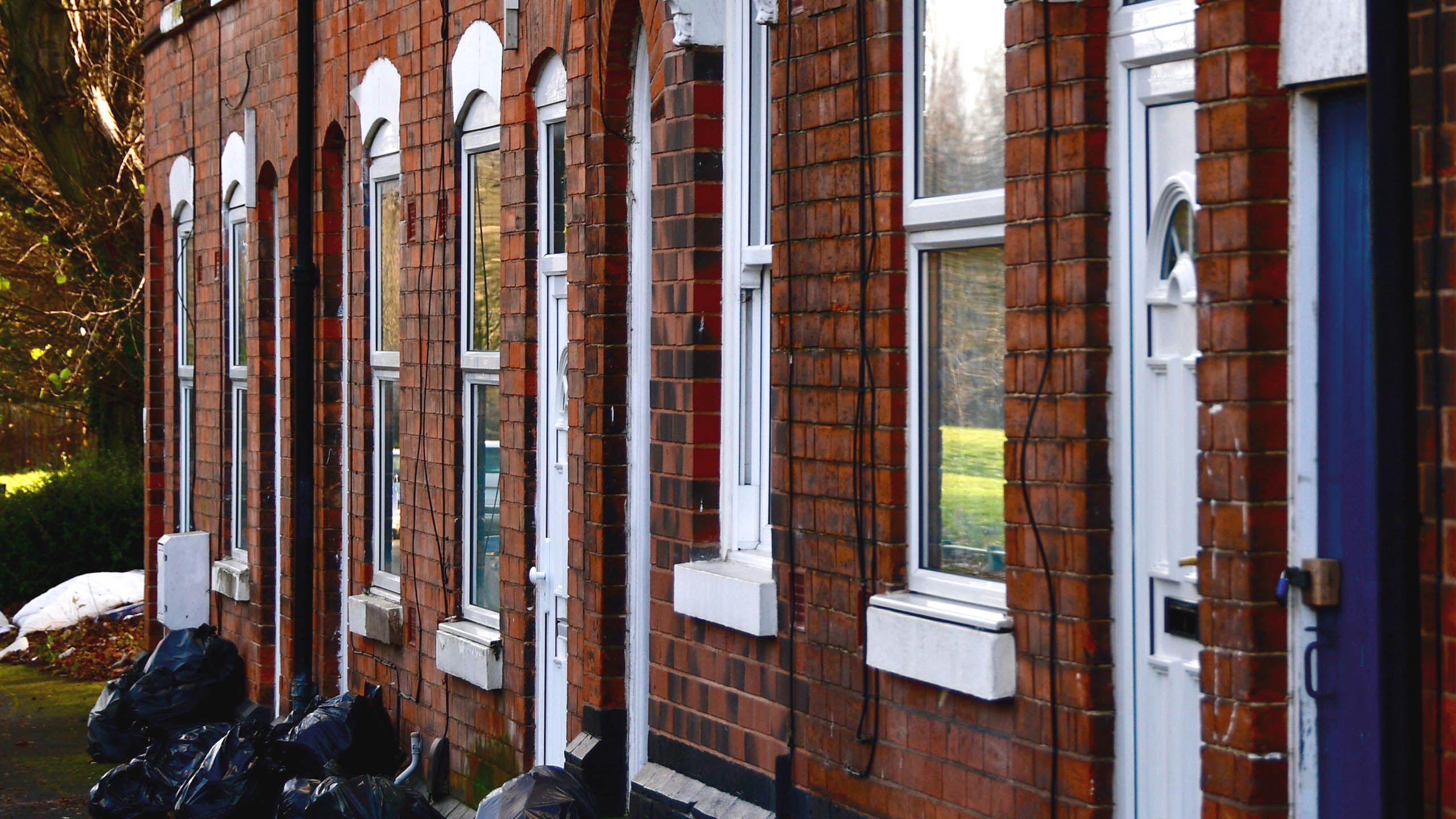



Hatoumata’s house in Winson Green, Birmingham, is cold and damp. Outside, a cupboard has been left by someone to rot.
Litter is scattered around the street. Almost every room of her home has black mould on the walls.
She worries about the cough her four-year-old daughter Fatou has developed. The cough is so pronounced, concerned staff at her nursery have also tried to contact the landlord about the damp.
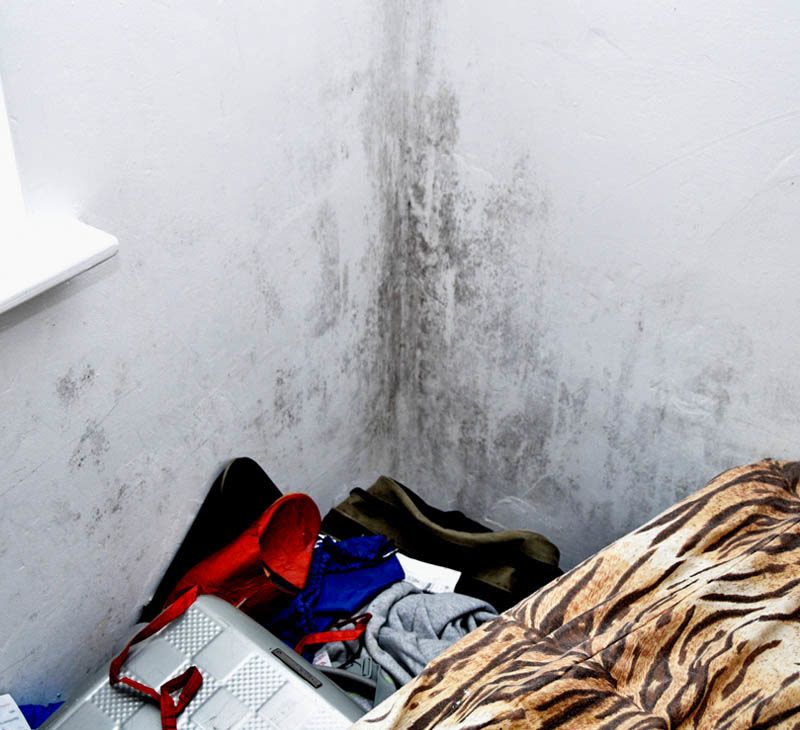
Unaware, little Fatou chirps and giggles as she plays around the house, her boundless energy keeping her mother busy.
Hatoumata tries to make her money last but it is hard. There is nothing spare after each cycle of benefits.
She has no family living nearby and very few friends. She is lonely and depressed.
It has been like this since her husband died.

Like most Gambian women, Hatoumata had always been dependent on men.
She was 10 years old when her family arranged her marriage to 37-year-old Mohammadou. She was his second wife but the age gap was not unusual - their marriage would not be consummated until she was an adult.
Mohammadou was already working in Spain and flew back there almost immediately after the wedding. Meanwhile, Hatoumata went to live with Mohammadou’s family in their compound.
She would see her husband infrequently over the next 12 years. Then, when she was 22, he asked her to live with him in Birmingham, where he had moved in search of work. She was soon mother to a baby girl.

“I was very lonely at first because I was missing my family and I was here alone as Mohammadou was out working all day,” she says.
“Over time, I began to settle. We planned to stay in Birmingham and this would be our life and to have more children.
“But then it changed.”
The night before the accident they had celebrated Eid at their local mosque. Although Ramadan had ended, Mohammadou had chosen to fast for six more days. So Hatoumata rose before dawn to heat through his breakfast.
After he left for work, she went back to bed with Fatou. They were asleep when she heard banging at the door. She opened it and was confronted by the sight of two police officers.
“They were standing outside and I asked ‘How can I help you?’, but I didn’t understand the language,” she says.
“Because of that, I said ‘Hold on, I will call my husband and he can talk to you’.
“So I called him and it was ringing and ringing and he wasn't picking it up.”
As she waited for a friend to come over to translate, other Gambian men - friends of her husband - turned up at her house. Some asked if she had been in touch with Mohammadou. None mentioned to her what had happened.
Eventually, her friend arrived and she learned, from the police, that her husband had died.
“I could not believe it,” Hatoumata says. “I knew he worked with metals but I never thought it was a dangerous job.”






Mohammadou’s death left Hatoumata isolated in a country where she knew few people and could not speak the language.
Dependent since childhood on her husband and his family, this family support network was now reduced.
Although she is supported by her fellow Soninke speakers in the area, she is less integrated within the Gambian community than when her husband was alive.
Her lack of good English - she says the lessons clash with her childcare - has also made it hard to assimilate in the UK.
“I honestly regret coming to this country,” she says. “Not that I could foresee this, but if I knew, I would never have come here.
“I would like to work, I really would, but I can’t right now because of childcare. My daughter is at nursery. Who would pick her up every day?
“I am just existing. There is a lot of thinking about the past, the present. It’s very depressing. I feel trapped here.”
Despite the loneliness, she is reluctant to return to The Gambia. Fatou, her daughter, was born in Birmingham and she wants her to have the life opportunities a UK education offers.
“Even to this day after the accident they have not come to see the families or given condolences”
Hatoumata's home is only a few miles from the recycling centre where her husband and the other men lost their lives. Yet she knows as little as Aminata and Dado about the accident.
She says she is “confused” about why she has had to wait so long for compensation, but would “rather have my husband here and have a happy life here”.
Her anger is focused on Shredmet, the company that employed her husband through an agency and which, she believes, has not treated the men’s families properly since.
“You cannot say they [Shredmet] are a good company,” she says.
“Even to this day after the accident they have not come to see the families or given condolences.
“This is very bad. They can't just leave us like this. They need to help. We need to be compensated and [not] just be left like this.”
Mohammadou’s death left Hatoumata isolated in a country where she knew few people and could not speak the language.
Dependent since childhood on her husband and his family, this family support network was now reduced.

Although she is supported by her fellow Soninke speakers in the area, she is less integrated within the Gambian community than when her husband was alive.
Her lack of good English - she says the lessons clash with her childcare - has also made it hard to assimilate in the UK.
“I honestly regret coming to this country,” she says. “Not that I could foresee this, but if I knew, I would never have come here.
“I would like to work, I really would, but I can’t right now because of childcare. My daughter is at nursery. Who would pick her up every day?
“I am just existing. There is a lot of thinking about the past, the present. It’s very depressing. I feel trapped here.”

Despite the loneliness, she is reluctant to return to The Gambia. Fatou, her daughter, was born in Birmingham and she wants her to have the life opportunities a UK education offers.
Hatoumata's home is only a few miles from the recycling centre where her husband and the other men lost their lives. Yet she knows as little as Aminata and Dado about the accident.
She says she is “confused” about why she has had to wait so long for compensation, but would “rather have my husband here and have a happy life here”.

Her anger is focused on Shredmet, the company that employed her husband through an agency and which, she believes, has not treated the men’s families properly since.
“You cannot say they [Shredmet] are a good company,” she says.
“Even to this day after the accident they have not come to see the families or given condolences.
“This is very bad. They cannot just leave us like this. They need to help. We need to be compensated and [not] just be left like this.”
Hawa

Hawa Kaba is at home in her terraced house in Leicester, where she has been living for the past two years with her son. She moved there from Birmingham following the accident, unable to cope with the constant reminders of her husband, Bangally.
While he was alive she would often see his bicycle outside the mosque near their home in Aston. After his death she found it too upsetting to walk past.
She had been working as a cleaner at a Travelodge in Birmingham city centre when the accident happened.
Despite being legally in the UK and having worked there for months, she panicked when the police arrived. Fearing she was to be deported, she ran to quickly gather her things.
Instead the two police officers said her husband was dead.
“The world did not really mean anything to me any more after that,” she says. “I was in a complete daze. But we did not know what had happened, no-one knew.
“It took me over a year to get over it. I still now get lapses… and fall back.”
“Not only could he not get regular, stable work, he lost his life”
Hawa is one of three widows, along with Hatoumata, still living in the UK. The other, Awa Dibba - wife of Almamo Jammeh - lives in Leeds. Like the others, Hawa has struggled financially.
“I work about 16 hours a week and have a rented council house, but it is cold in the kitchen with a hole in the ceiling to the outside,” she says.
“My son is at school here, but he doesn't like talking about his dad. It has really affected him. They were very, very close.”
Hawa and her son had followed Bangally to the UK from Spain. She says she had stressed to her husband many times how insecure his work was and that he should find something else.
“But he said ‘What can I do? I don’t speak English yet and if I leave this work, how am I going to look after us?’,” she says.
“There are limited options available. He was going for English classes while he worked but did not know enough yet.
“It was very difficult to leave Spain to come here as immigrants. Our objective was to work and look after family. But when he came here not only could he not get regular, stable work, he lost his life.”

Following the accident, the families had to wait two years for the inquest to be held. Until this concluded they could not legally begin a compensation claim.
An HSE report prepared ahead of the inquest was clear about why the wall fell.
“The wall collapsed because it was not designed to withstand the lateral loads imposed by the steel briquettes and was therefore inherently unstable,” it said.
“The loading increased from one side as material was removed from the bay the men were working in. The fact that the walls were not properly designed, in [the inspector's view], was the reason why it collapsed.”
The report said Shredmet could have installed walls designed to withstand the loads. After the accident, other retaining walls at the site were inspected and also found to be defective.
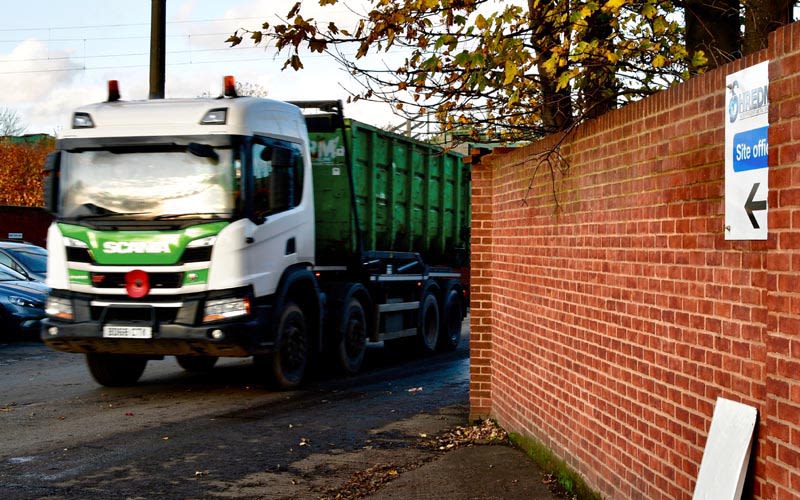
While Shredmet kept daily and monthly inspection records it had failed to recognise the walls were dangerous.
The fatal accident was not Shredmet's first health and safety incident. In 2012 the firm was fined £50,000 over an accident in which an employee's arm was injured.
The company subsequently employed a health and safety adviser, Michael White. But the inquest was told he had only spent a total of 12 hours at the Nechells site in the year before the men's deaths.
The inquest heard conflicting accounts from Shredmet and Mr White about the wall. Although Shredmet said it had been in situ for about 18 months prior to the collapse, Mr White said he could not recall seeing it and had never been asked to assess its safety.
Just months before the accident, there was also a large fire at the site. West Midlands Fire Service says the cause was accidental and it subsequently gave the company advice.
The families’ civil compensation claim began about a year ago. Their lawyer asked Shredmet for an initial payment to help the struggling families - without admitting liability - but the company refused.
Shredmet has declined to comment, citing the ongoing HSE investigation. But at the time of the inquest, managing director Wayne Hawkeswood said he was "absolutely devastated" by the deaths of the five men and constantly thought about "the loss their family and friends have suffered".
Like the other widows, Hawa feels abandoned since the accident. They are angry at the lack of contact from Shredmet and the speed with which the company resumed operations after the men's deaths.

“What has really shocked me is that the company got up and running so soon afterwards,” Hawa says.
“They did not do what they should to protect the workers and they don't respect human beings.
“This is part of their culture, they have no respect.”

Hawa had urged her husband Bangally to find more secure work
Hawa had urged her husband Bangally to find more secure work


Hawa Kaba is at home in her terraced house in Leicester, where she has been living for the past two years with her son. She moved there from Birmingham following the accident, unable to cope with the constant reminders of her husband, Bangally.
While he was alive she would often see his bicycle outside the mosque near their home in Aston. After his death she found it too upsetting to walk past.
She had been working as a cleaner at a Travelodge in Birmingham city centre when the accident happened.
Despite being legally in the UK and having worked there for months, she panicked when the police arrived. Fearing she was to be deported, she ran to quickly gather her things.
Instead the two police officers said her husband was dead.
“The world did not really mean anything to me any more after that,” she says. “I was in a complete daze. But we did not know what had happened, no-one knew.
“It took me over a year to get over it. I still now get lapses… and fall back.”

Hawa had urged her husband Bangally to find more secure work
Hawa had urged her husband Bangally to find more secure work
Hawa is one of three widows, along with Hatoumata, still living in the UK. The other, Awa Dibba - wife of Almamo Jammeh - lives in Leeds. Like the others, Hawa has struggled financially.
“I work about 16 hours a week and have a rented council house, but it is cold in the kitchen with a hole in the ceiling to the outside,” she says.
“My son is at school here, but he doesn't like talking about his dad. It has really affected him. They were very, very close.”
Hawa and her son had followed Bangally to the UK from Spain. She says she had stressed to her husband many times how insecure his work was and that he should find something else.
“But he said ‘What can I do? I don’t speak English yet and if I leave this work, how am I going to look after us?’,” she says.
“There are limited options available. He was going for English classes while he worked but did not know enough yet.
“It was very difficult to leave Spain to come here as immigrants. Our objective was to work and look after family. But when he came here not only could he not get regular, stable work, he lost his life.”

Following the accident, the families had to wait two years for the inquest to be held. Until this concluded they could not legally begin a compensation claim.
An HSE report prepared ahead of the inquest was clear about why the wall fell.
“The wall collapsed because it was not designed to withstand the lateral loads imposed by the steel briquettes and was therefore inherently unstable,” it said.

“The loading increased from one side as material was removed from the bay the men were working in. The fact that the walls were not properly designed, in [the inspector's view], was the reason why it collapsed.”
The report said Shredmet could have installed walls designed to withstand the loads. After the accident, other retaining walls at the site were inspected and also found to be defective.
While Shredmet kept daily and monthly inspection records it had failed to recognise the walls were dangerous.

The fatal accident was not Shredmet's first health and safety incident. In 2012 the firm was fined £50,000 over an accident in which an employee's arm was injured.
The company subsequently employed a health and safety adviser, Michael White. But the inquest was told he had only spent a total of 12 hours at the Nechells site in the year before the men's deaths.
The inquest heard conflicting accounts from Shredmet and Mr White about the wall. Although Shredmet said it had been in situ for about 18 months prior to the collapse, Mr White said he could not recall seeing it and had never been asked to assess its safety.
Just months before the accident, there was also a large fire at the site. West Midlands Fire Service says the cause was accidental and it subsequently gave the company advice.
The families’ civil compensation claim began about a year ago. Their lawyer asked Shredmet for an initial payment to help the struggling families - without admitting liability - but the company refused.

Shredmet has declined to comment, citing the ongoing HSE investigation. But at the time of the inquest, managing director Wayne Hawkeswood said he was "absolutely devastated" by the deaths of the five men and constantly thought about "the loss their family and friends have suffered".
Like the other widows, Hawa feels abandoned since the accident. They are angry at the lack of contact from Shredmet and the speed with which the company resumed operations after the men's deaths.
“What has really shocked me is that the company got up and running so soon afterwards,” Hawa says.
“They did not do what they should to protect the workers and they don't respect human beings.
“This is part of their culture, they have no respect.”
'A shocking case'




“By any standard this is a profoundly shocking case - no-one should go to work and die in 21st Century Britain.”
Daniel Lemberger Cooper, the families’ lawyer, works for Imran Khan & Partners, the firm that represented the family of the murdered black teenager Stephen Lawrence.
He maintains the tragedy at Shredmet is only a small part of a wider problem. The men’s deaths, he warns, have implications for anyone employed in similar jobs.
The industry the men were employed in - waste and recycling - is the second most dangerous in the UK. Between 2014 and 2018, almost eight in every 100,000 workers died. This rate is 17 times the national average, according to a 2019 HSE report.
It is among the UK’s most lucrative industries, worth an estimated £7bn a year to the economy. In recent years it has enjoyed a boom. Demand has been driven by rising metal prices, a shortage of landfill sites and laws restricting the dumping of electronic equipment in them.
Mr Cooper says the recycling industry “exploits migrant labour for enormous profits”.

Daniel Lemberger Cooper said the men's deaths raised issues for every worker in Britain
Daniel Lemberger Cooper said the men's deaths raised issues for every worker in Britain
“There is a now huge demand for recycling and the industry is getting bigger and bigger, and these workers will be needed more and more,” he says.
“The five men were honest, hardworking and decent human beings.
“The conditions in which these workers were employed, of precarious employment, zero-hours contracts, temporary and agency work, the so-called gig economy and exploitation, and issues of low pay and long hours are spreading throughout the economy,” he adds.
“This is an issue for every worker in Britain.”
Leading safety experts say the standard of the UK’s health and safety enforcement has declined over the past decade.
After years of cuts there are fewer inspectors carrying out fewer inspections, leaving many workplaces unsafe, they say.
Shredmet had not been inspected by the HSE since the 2010 accident in which an employee injured their arm.

Lawrence Waterman, chairman of the British Safety Council, says the HSE has been under-resourced since the days of the coalition government.
In 2010 the government imposed 33% cuts on the HSE. Then, in 2012, the Prime Minister David Cameron stated the UK's "excessive" health and safety culture was costing businesses billions and he intended to "kill" it off for good.
After the Conservatives won the general election in 2015, further cuts followed in the Spending Review later that year.

Lawrence Waterman said more effort was needed to keep workplaces safe
Lawrence Waterman said more effort was needed to keep workplaces safe
“It’s not just resources that have had an impact,” says Mr Waterman.
"It’s the political hangover of now two prime ministers ago who wanted to kill health and safety, with a feeling that red tape ruled and we were being told how to live our lives.
“Well, the other side of that is that five guys never came home to their families.
“Hanging over businesses and the government is the need to be honest and place more value on looking after people at work.”
Hilda Palmer, from the Hazards Campaign, which promotes workplace safety, says a disproportionately large number of those killed or injured at work are immigrants.
“Unfortunately, if you look at the names of the people that are killed, they are mostly foreign-sounding names - eastern Europeans and now west African,” she says.
“I also know of a case involving some Peruvians. It seems it’s the new wave of migrants that get drawn in - the most vulnerable.”
She says legislation, enforcement and trade unions have all been “attacked through the cuts”.

Laws restricting the dumping of electronic equipment in landfill have fuelled demand for recycling
Laws restricting the dumping of electronic equipment in landfill have fuelled demand for recycling
“That creates an environment for cowboys to flourish,” she added. “If employers see checks being done, prosecutions, fines and notices being issued, that reminds them to act.”
The Conservatives declined to comment but Vince Cable, the former Liberal Democrat leader who was a member of the coalition cabinet, says the global financial crisis was to blame.
“Austerity was going to happen whatever government came in,” he says.
“The cuts [Labour chancellor] Alistair Darling had were the same as what the coalition did and this was as a result of the huge financial crisis and reduced revenue that the country found itself in.”
The dead men's families remain bewildered that three years after the accident the HSE has still not decided whether or not to charge Shredmet.
Mr Waterman says the slowness of the HSE investigation is due to its underfunding. The HSE aims to complete 80% of fatal investigations within one year but in 2018-19 just 65% were.
“When you look at that, it’s not unreasonable for the families to feel that justice is being denied,” Mr Waterman says.
“If the families of the five guys were plugged-in middle-class agitators, there may have been more pressure being felt to keep the HSE focused on finding out what happened.”
“If immediate, legislative change is not enacted, there are going to be more injuries and further deaths”
The HSE says the families’ demand for a speedy conclusion is “understandable” but it needs to ensure its investigation is “thorough”.
“As with many complex, challenging criminal investigations relating to multiple fatalities, following new lines of inquiry and forensically examining evidence can mean investigations take longer than families would understandably hope,” a spokesman says.
“Since the inquests concluded... our time and energy has been fully focused on reviewing the case, bringing together evidence heard by the coroner and concluding the criminal investigation.
“We are working hard to resolve any delays and have endeavoured to give regular updates to the families where possible.”
The families' lawyer believes they are the victims of a legal system that does not treat deaths at work with the same seriousness as other fatalities.
“The criminal justice system fails to treat deaths and injuries at work – unlike deaths in almost any other setting – as the possible outcome of serious crimes and this must urgently change,” he says.
He wants the government to legislate to prevent the exploitation of workers.
“A fitting tribute and legacy to those that died would be that immediate steps are taken by government to ensure that we learn the lessons of why these men died so that no-one else suffers like they have,” he says.
“If immediate, legislative change is not enacted, there are going to be more injuries and further deaths. The government and employers will have blood on their hands.”
“By any standard this is a profoundly shocking case - no-one should go to work and die in 21st Century Britain.”
Daniel Lemberger Cooper, the families’ lawyer, works for Imran Khan & Partners, the firm that represented the family of the murdered black teenager Stephen Lawrence.
He maintains the tragedy at Shredmet is only a small part of a wider problem. The men’s deaths, he warns, have implications for anyone employed in similar jobs.
The industry the men were employed in - waste and recycling - is the second most dangerous in the UK. Between 2014 and 2018, almost eight in every 100,000 workers died. This rate is 17 times the national average, according to a 2019 HSE report.
It is among the UK’s most lucrative industries, worth an estimated £7bn a year to the economy. In recent years it has enjoyed a boom. Demand has been driven by rising metal prices, a shortage of landfill sites and laws restricting the dumping of electronic equipment in them.
Mr Cooper says the recycling industry “exploits migrant labour for enormous profits”.

Daniel Lemberger Cooper said the men's deaths raised issues for every worker in Britain
Daniel Lemberger Cooper said the men's deaths raised issues for every worker in Britain
“There is a now huge demand for recycling and the industry is getting bigger and bigger, and these workers will be needed more and more,” he says.
“The five men were honest, hardworking and decent human beings.
“The conditions in which these workers were employed, of precarious employment, zero-hours contracts, temporary and agency work, the so-called gig economy and exploitation, and issues of low pay and long hours are spreading throughout the economy,” he adds.
“This is an issue for every worker in Britain.”
Leading safety experts say the standard of the UK’s health and safety enforcement has declined over the past decade.
After years of cuts there are fewer inspectors carrying out fewer inspections, leaving many workplaces unsafe, they say.

Shredmet had not been inspected by the HSE since the 2010 accident in which an employee injured their arm.
Lawrence Waterman, chairman of the British Safety Council, says the HSE has been under-resourced since the days of the coalition government.
In 2010 the government imposed 33% cuts on the HSE. Then, in 2012, the Prime Minister David Cameron stated the UK's "excessive" health and safety culture was costing businesses billions and he intended to "kill" it off for good.
After the Conservatives won the general election in 2015, further cuts followed in the Spending Review later that year.

Lawrence Waterman said more effort was needed to keep workplaces safe
Lawrence Waterman said more effort was needed to keep workplaces safe
“It’s not just resources that have had an impact,” says Mr Waterman.
"It’s the political hangover of now two prime ministers ago who wanted to kill health and safety, with a feeling that red tape ruled and we were being told how to live our lives.
“Well, the other side of that is that five guys never came home to their families.
“Hanging over businesses and the government is the need to be honest and place more value on looking after people at work.”
Hilda Palmer, from the Hazards Campaign, which promotes workplace safety, says a disproportionately large number of those killed or injured at work are immigrants.
“Unfortunately, if you look at the names of the people that are killed, they are mostly foreign-sounding names - eastern Europeans and now west African,” she says.
“I also know of a case involving some Peruvians. It seems it’s the new wave of migrants that get drawn in - the most vulnerable.”

Flowers left at the site of the accident in 2016
Flowers left at the site of the accident in 2016
She says legislation, enforcement and trade unions have all been “attacked through the cuts”.
“That creates an environment for cowboys to flourish,” she added. “If employers see checks being done, prosecutions, fines and notices being issued, that reminds them to act.”
The Conservatives declined to comment but Vince Cable, the former Liberal Democrat leader who was a member of the coalition cabinet, says the global financial crisis was to blame.
“Austerity was going to happen whatever government came in,” he says.
“The cuts [Labour chancellor] Alistair Darling had were the same as what the coalition did and this was as a result of the huge financial crisis and reduced revenue that the country found itself in.”

Laws restricting the dumping of electronic equipment in landfill have fuelled demand for recycling
Laws restricting the dumping of electronic equipment in landfill have fuelled demand for recycling
The dead men's families remain bewildered that three years after the accident the HSE has still not decided whether or not to charge Shredmet.
Mr Waterman says the slowness of the HSE investigation is due to its underfunding. The HSE aims to complete 80% of fatal investigations within one year but in 2018-19 just 65% were.
“When you look at that, it’s not unreasonable for the families to feel that justice is being denied,” Mr Waterman says.
“If the families of the five guys were plugged-in middle-class agitators, there may have been more pressure being felt to keep the HSE focused on finding out what happened.”
“If immediate, legislative change is not enacted, there are going to be more injuries and further deaths”
The HSE says the families’ demand for a speedy conclusion is “understandable” but it needs to ensure its investigation is “thorough”.
“As with many complex, challenging criminal investigations relating to multiple fatalities, following new lines of inquiry and forensically examining evidence can mean investigations take longer than families would understandably hope,” a spokesman says.
“Since the inquests concluded... our time and energy has been fully focused on reviewing the case, bringing together evidence heard by the coroner and concluding the criminal investigation.
“We are working hard to resolve any delays and have endeavoured to give regular updates to the families where possible.”
The families' lawyer believes they are the victims of a legal system that does not treat deaths at work with the same seriousness as other fatalities.
“The criminal justice system fails to treat deaths and injuries at work – unlike deaths in almost any other setting – as the possible outcome of serious crimes and this must urgently change,” Mr Cooper says.
He wants the government to legislate to prevent the exploitation of workers.
“A fitting tribute and legacy to those that died would be that immediate steps are taken by government to ensure that we learn the lessons of why these men died so that no-one else suffers like they have,” he says.
“If immediate, legislative change is not enacted, there are going to be more injuries and further deaths. The government and employers will have blood on their hands.”
'We are powerless'

Three years after the wall fell on him, Tombong still walks with a limp. The 55-year-old had been cleaning out the bay with the other men when he heard a sudden, loud rumble.
He was knocked out by the concrete blocks and, when he came to amid the dust and debris, he discovered he was pinned to the ground by a 1.5-tonne concrete block on his legs.
He drifted in and out of consciousness as rescuers scrambled to extract him.
“I couldn't move, I could just hear noise and feel the pain in my leg,” he says. “I didn’t know what was going on.”
When he woke up properly he was in hospital. He did not realise his colleagues had died until his friend Bassamba, who witnessed the accident, told him.
“I’m in limbo. I am suffering”
It was devastating and not only on an emotional level. He had only been working at the site for two months and has been unemployed ever since.
Standing can be painful while sitting down for too long also causes him discomfort.
He relies on the charity of his local mosque in Smethwick to survive and says he has had difficulty claiming sickness benefit.
He is haunted by the memories of what happened that summer’s day.
“When I think about it sometimes I can’t get to sleep,” he says. “I lose my mind if I sit down and think about it all. I can’t move on. I can’t work. What can I do?
“I’ve been going round in circles. I’m in limbo. I am suffering.
“We are powerless. What can we do?”

Credits:
Reporting: Caroline Gall
Additional reporting: Daniel Wainwright
Translation: Ebrima Sillah
Video: FC Barcelona
Location photography:
Parets del Valles: Xavier Cervera Vallve (Panos)
Serrekunda: Sylvain Cherkaoui (Panos)
Birmingham/Leicester: John Bray
Other photography:
Getty, Press Association, SWNS
Editor & online production: Dave Green